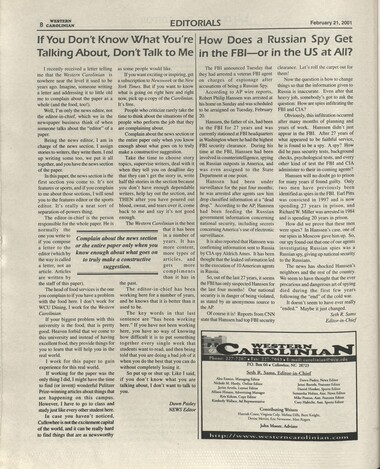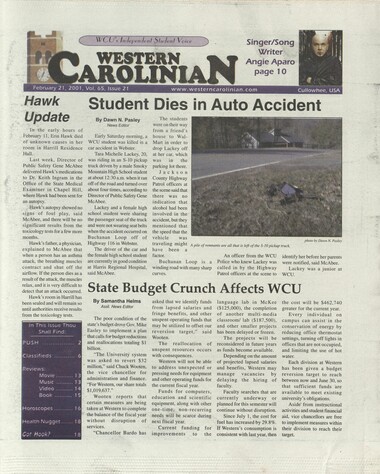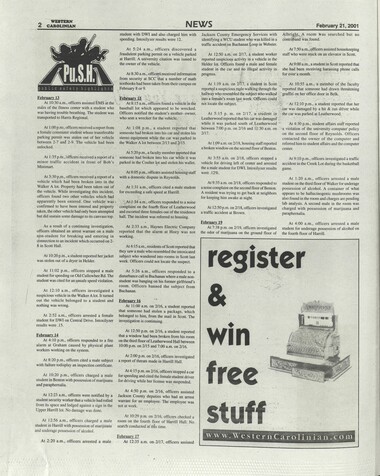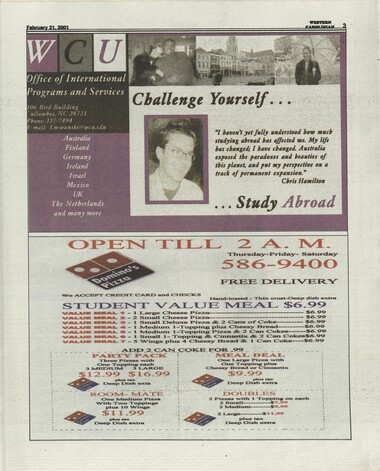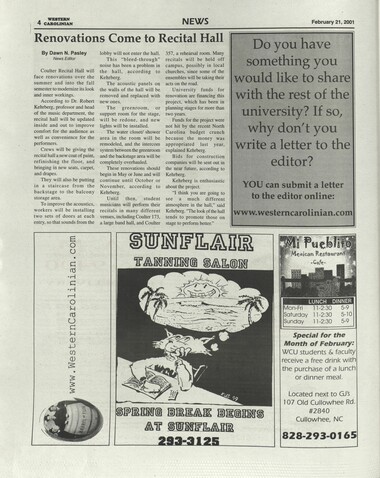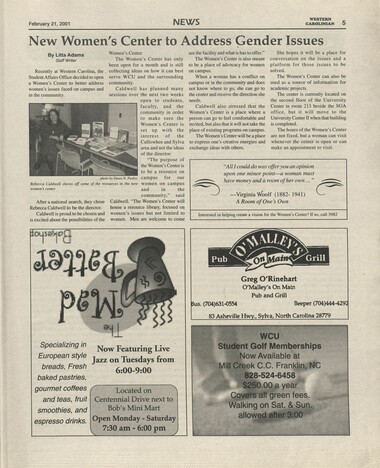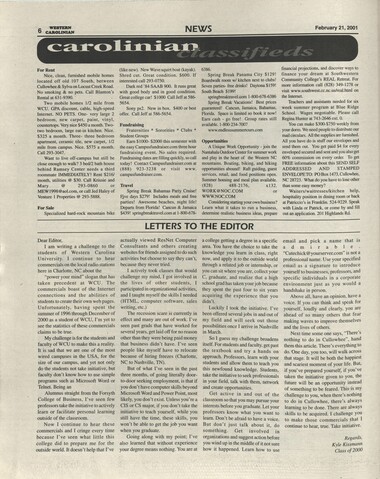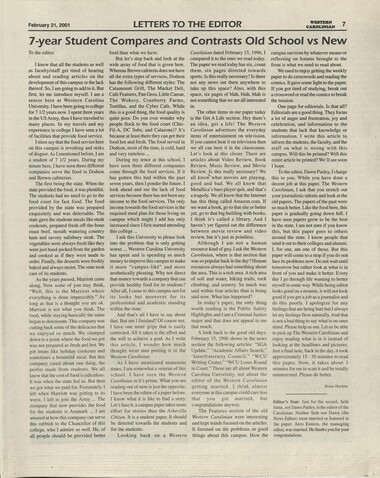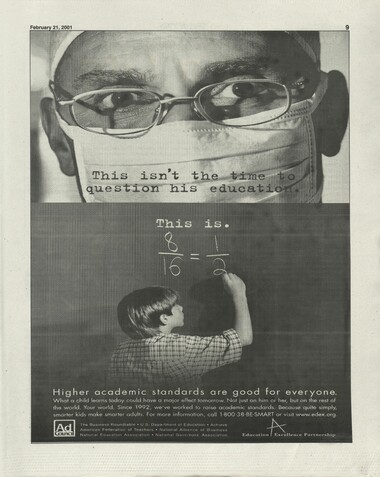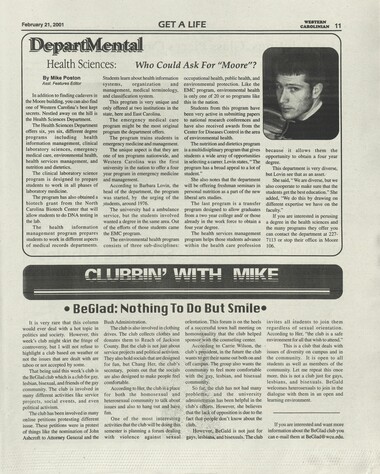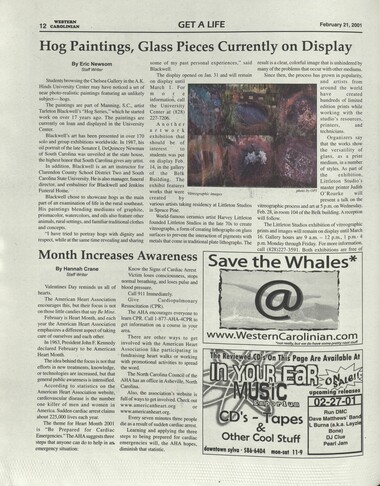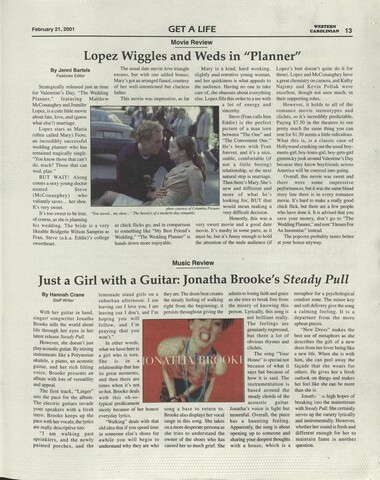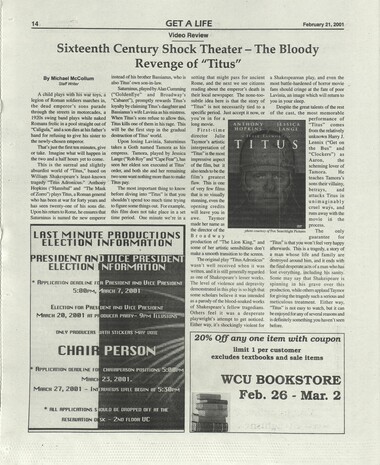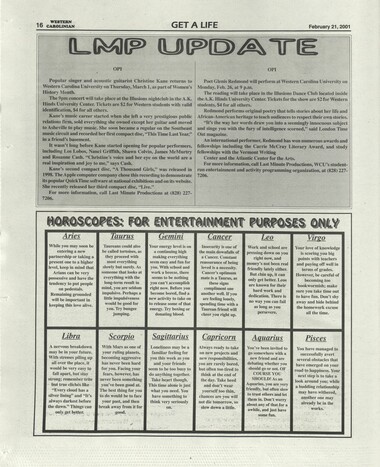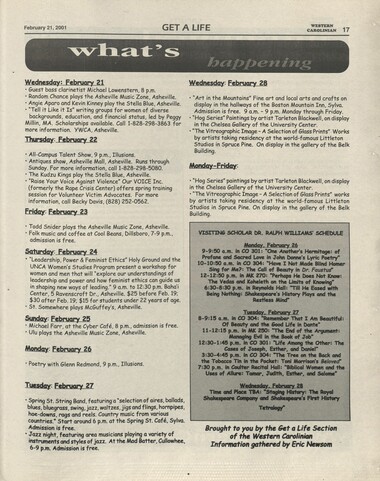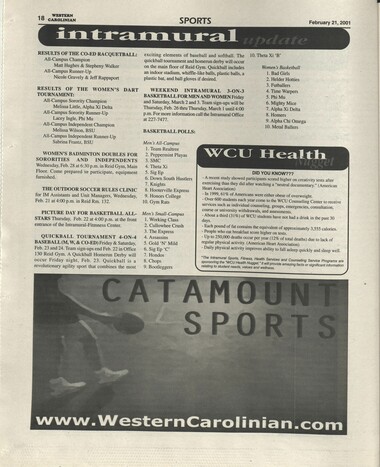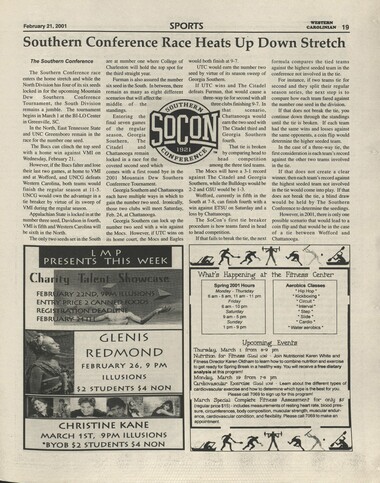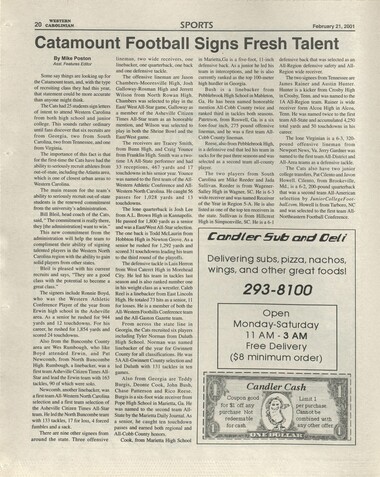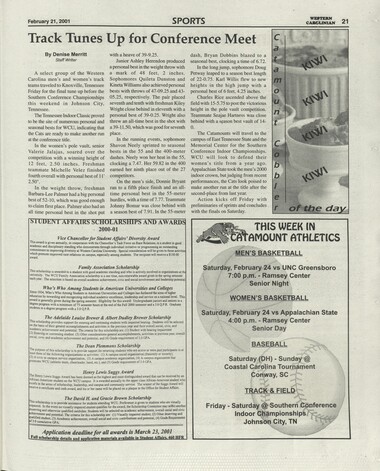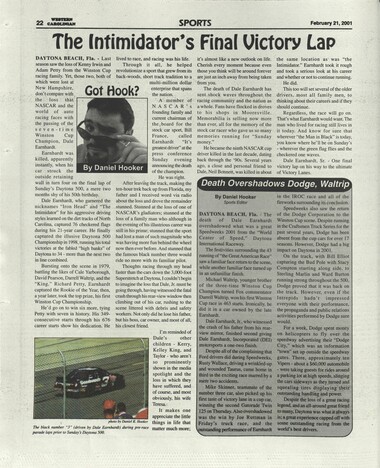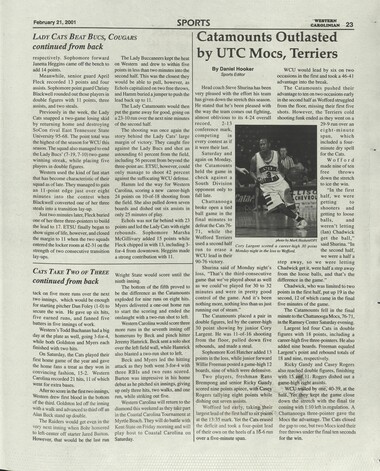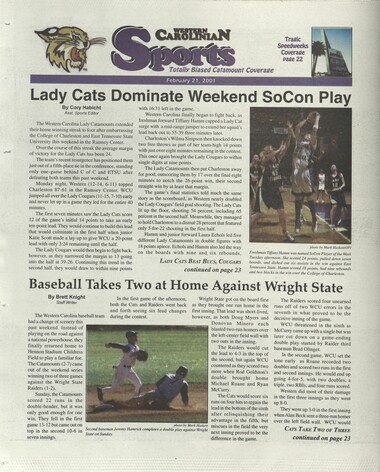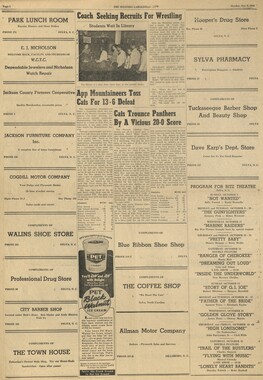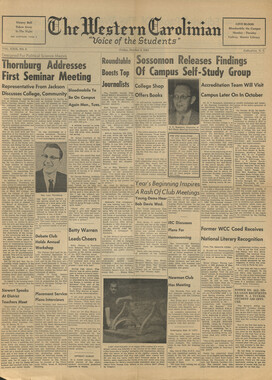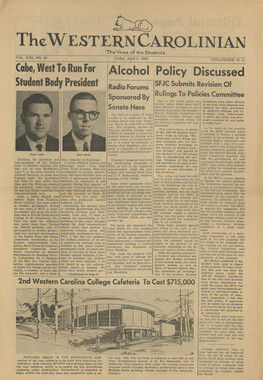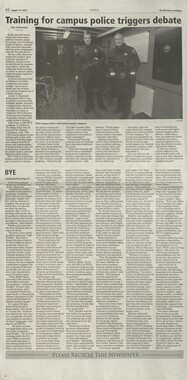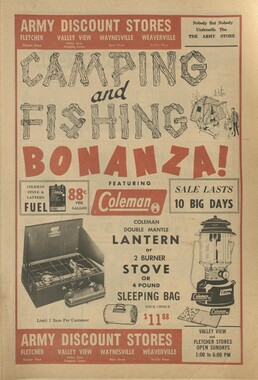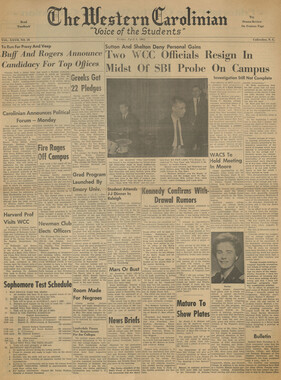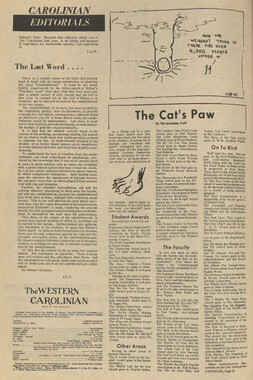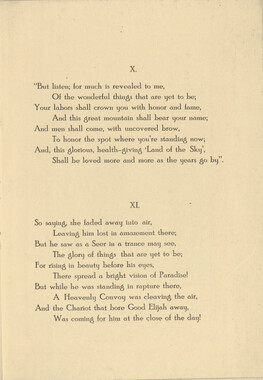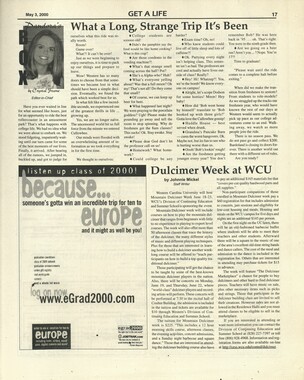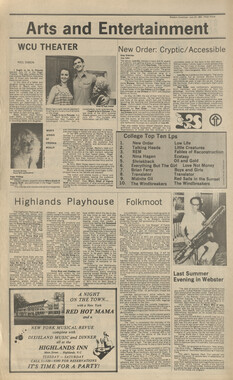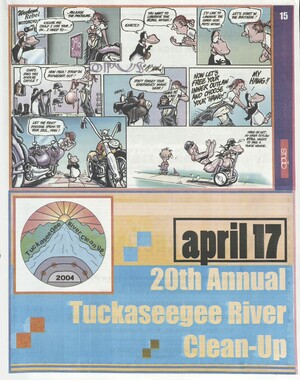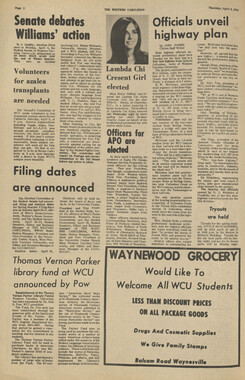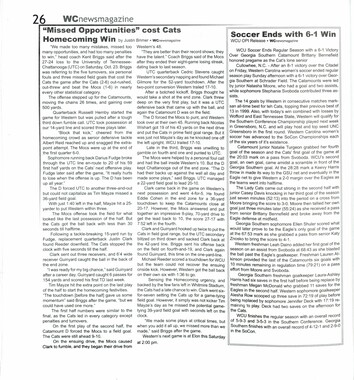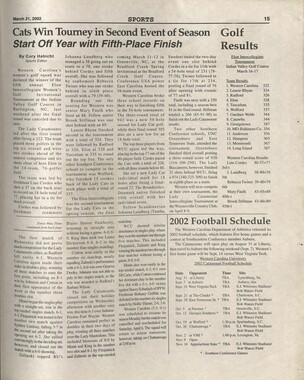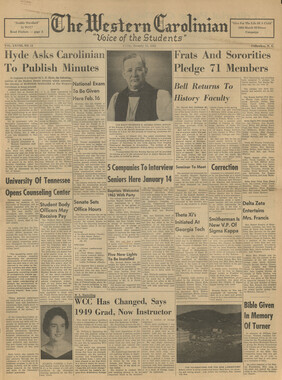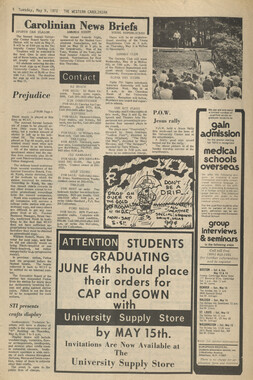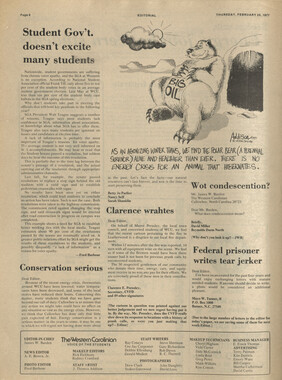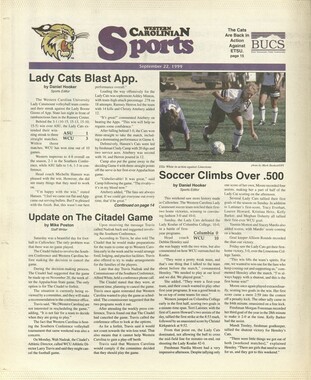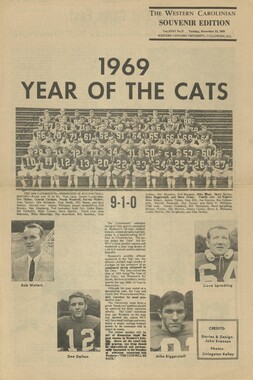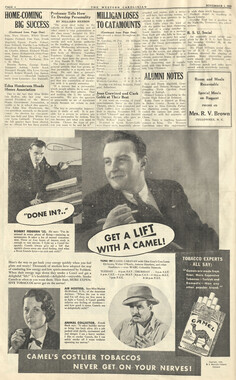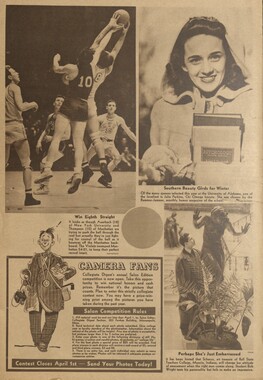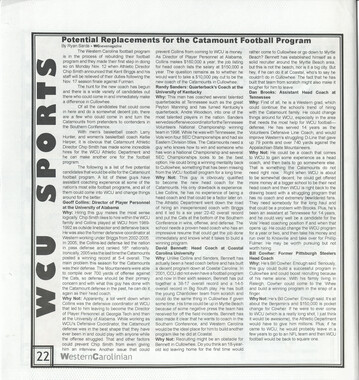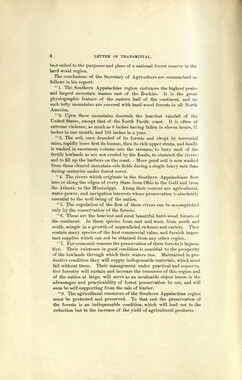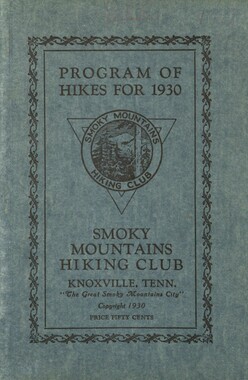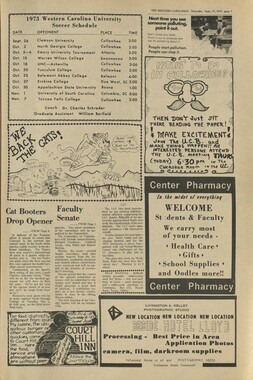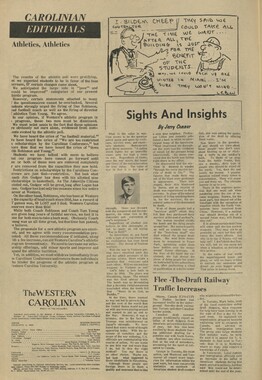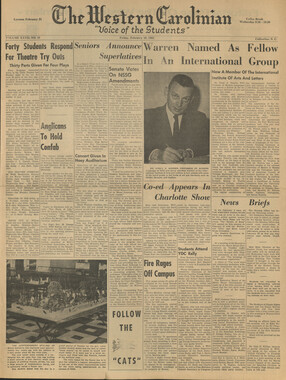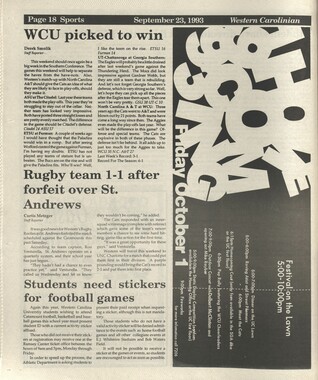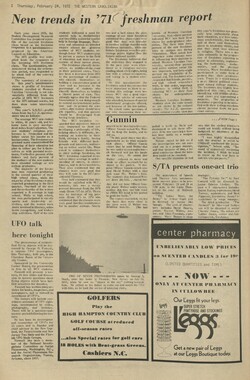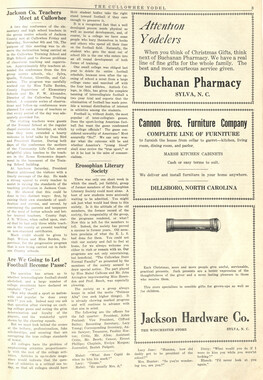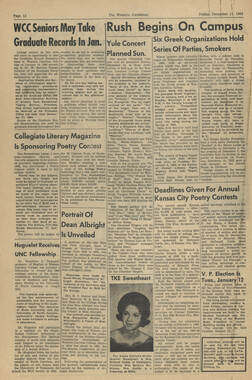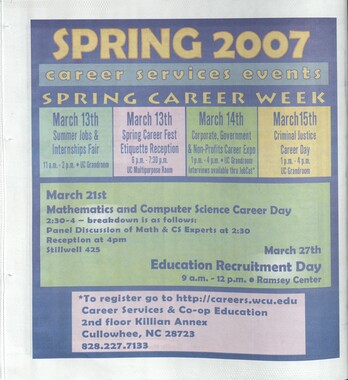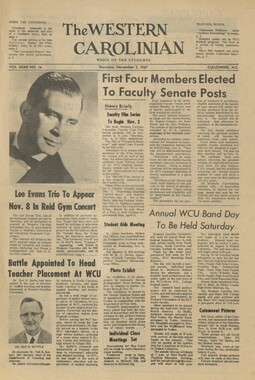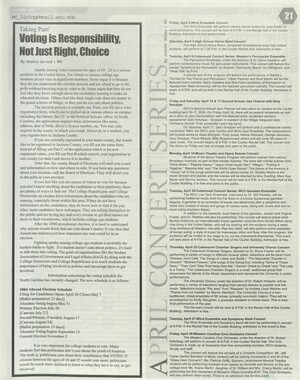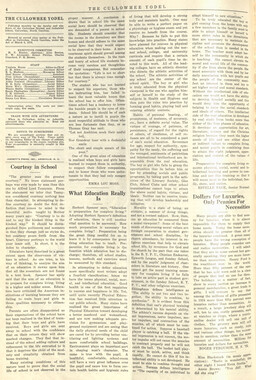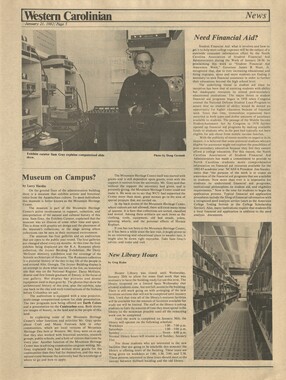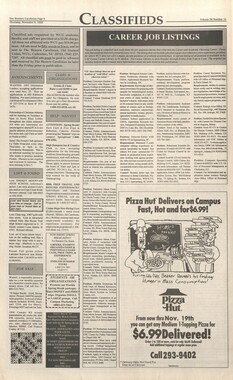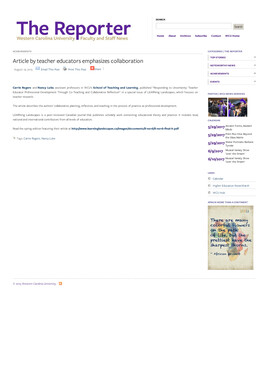Western Carolina University (21)
View all
- Canton Champion Fibre Company (2308)
- Cherokee Traditions (291)
- Civil War in Southern Appalachia (165)
- Craft Revival (1942)
- George Masa Collection (137)
- Great Smoky Mountains - A Park for America (3080)
- Highlights from Western Carolina University (422)
- Horace Kephart (973)
- Journeys Through Jackson (159)
- LGBTQIA+ Archive of Jackson County (89)
- Oral Histories of Western North Carolina (318)
- Picturing Appalachia (6617)
- Stories of Mountain Folk (413)
- Travel Western North Carolina (153)
- Western Carolina University Fine Art Museum Vitreograph Collection (129)
- Western Carolina University Herbarium (92)
- Western Carolina University: Making Memories (738)
- Western Carolina University Publications (2491)
- Western Carolina University Restricted Electronic Theses and Dissertations (146)
- Western North Carolina Regional Maps (71)
- World War II in Southern Appalachia (131)
University of North Carolina Asheville (6)
View all
- Allanstand Cottage Industries (62)
- Appalachian National Park Association (53)
- Bennett, Kelly, 1890-1974 (1463)
- Berry, Walter (76)
- Brasstown Carvers (40)
- Carver, George Washington, 1864?-1943 (26)
- Cathey, Joseph, 1803-1874 (1)
- Champion Fibre Company (233)
- Champion Paper and Fibre Company (297)
- Cherokee Indian Fair Association (16)
- Cherokee Language Program (22)
- Crowe, Amanda (40)
- Edmonston, Thomas Benton, 1842-1907 (7)
- Ensley, A. L. (Abraham Lincoln), 1865-1948 (275)
- Fromer, Irving Rhodes, 1913-1994 (70)
- George Butz (BFS 1907) (46)
- Goodrich, Frances Louisa (120)
- Grant, George Alexander, 1891-1964 (96)
- Heard, Marian Gladys (60)
- Kephart, Calvin, 1883-1969 (15)
- Kephart, Horace, 1862-1931 (313)
- Kephart, Laura, 1862-1954 (67)
- Laney, Gideon Thomas, 1889-1976 (439)
- Masa, George, 1881-1933 (61)
- McElhinney, William Julian, 1896-1953 (44)
- Niggli, Josephina, 1910-1983 (10)
- North Carolina Park Commission (105)
- Osborne, Kezia Stradley (9)
- Owens, Samuel Robert, 1918-1995 (11)
- Penland Weavers and Potters (36)
- Roberts, Vivienne (15)
- Roth, Albert, 1890-1974 (142)
- Schenck, Carl Alwin, 1868-1955 (1)
- Sherrill's Photography Studio (2565)
- Southern Highland Handicraft Guild (127)
- Southern Highlanders, Inc. (71)
- Stalcup, Jesse Bryson (46)
- Stearns, I. K. (213)
- Thompson, James Edward, 1880-1976 (226)
- United States. Indian Arts and Crafts Board (130)
- USFS (683)
- Vance, Zebulon Baird, 1830-1894 (1)
- Weaver, Zebulon, 1872-1948 (58)
- Western Carolina College (230)
- Western Carolina Teachers College (282)
- Western Carolina University (2008)
- Western Carolina University. Mountain Heritage Center (18)
- Whitman, Walt, 1819-1892 (10)
- Wilburn, Hiram Coleman, 1880-1967 (73)
- Williams, Isadora (3)
- Cain, Doreyl Ammons (0)
- Crittenden, Lorraine (0)
- Rhodes, Judy (0)
- Smith, Edward Clark (0)
- Appalachian Region, Southern (3032)
- Asheville (N.C.) (1945)
- Avery County (N.C.) (26)
- Blount County (Tenn.) (195)
- Buncombe County (N.C.) (1680)
- Cherokee County (N.C.) (283)
- Clay County (N.C.) (556)
- Graham County (N.C.) (238)
- Great Smoky Mountains National Park (N.C. and Tenn.) (525)
- Haywood County (N.C.) (3573)
- Henderson County (N.C.) (70)
- Jackson County (N.C.) (4925)
- Knox County (Tenn.) (35)
- Knoxville (Tenn.) (13)
- Lake Santeetlah (N.C.) (10)
- Macon County (N.C.) (421)
- Madison County (N.C.) (216)
- McDowell County (N.C.) (39)
- Mitchell County (N.C.) (135)
- Polk County (N.C.) (35)
- Qualla Boundary (982)
- Rutherford County (N.C.) (78)
- Swain County (N.C.) (2185)
- Transylvania County (N.C.) (270)
- Watauga County (N.C.) (12)
- Waynesville (N.C.) (86)
- Yancey County (N.C.) (72)
- Aerial Photographs (3)
- Aerial Views (60)
- Albums (books) (4)
- Articles (1)
- Artifacts (object Genre) (228)
- Bibliographies (1)
- Biography (general Genre) (2)
- Cards (information Artifacts) (38)
- Clippings (information Artifacts) (192)
- Copybooks (instructional Materials) (3)
- Crafts (art Genres) (622)
- Depictions (visual Works) (21)
- Design Drawings (1)
- Digital Moving Image Formats (2)
- Drawings (visual Works) (185)
- Envelopes (101)
- Exhibitions (events) (1)
- Facsimiles (reproductions) (1)
- Fiction (general Genre) (4)
- Financial Records (12)
- Fliers (printed Matter) (67)
- Glass Plate Negatives (381)
- Guidebooks (2)
- Internegatives (10)
- Interviews (823)
- Land Surveys (102)
- Letters (correspondence) (1045)
- Manuscripts (documents) (618)
- Maps (documents) (177)
- Memorandums (25)
- Minutes (administrative Records) (59)
- Negatives (photographs) (6090)
- Newsletters (1290)
- Newspapers (2)
- Notebooks (8)
- Occupation Currency (1)
- Paintings (visual Works) (1)
- Pen And Ink Drawings (1)
- Periodicals (194)
- Personal Narratives (10)
- Photographs (12977)
- Plans (maps) (1)
- Poetry (6)
- Portraits (4568)
- Postcards (329)
- Programs (documents) (181)
- Publications (documents) (2444)
- Questionnaires (65)
- Relief Prints (26)
- Sayings (literary Genre) (1)
- Scrapbooks (282)
- Sheet Music (2)
- Slides (photographs) (402)
- Songs (musical Compositions) (2)
- Sound Recordings (802)
- Specimens (92)
- Speeches (documents) (18)
- Tintypes (photographs) (8)
- Transcripts (329)
- Text Messages (0)
- A.L. Ensley Collection (275)
- Appalachian Industrial School Records (7)
- Appalachian National Park Association Records (336)
- Axley-Meroney Collection (2)
- Bayard Wootten Photograph Collection (20)
- Bethel Rural Community Organization Collection (7)
- Blumer Collection (5)
- C.W. Slagle Collection (20)
- Canton Area Historical Museum (2110)
- Carlos C. Campbell Collection (462)
- Cataloochee History Project (64)
- Cherokee Studies Collection (4)
- Daisy Dame Photograph Album (5)
- Daniel Boone VI Collection (1)
- Doris Ulmann Photograph Collection (112)
- Elizabeth H. Lasley Collection (1)
- Elizabeth Woolworth Szold Fleharty Collection (4)
- Frank Fry Collection (95)
- George Masa Collection (173)
- Gideon Laney Collection (452)
- Hazel Scarborough Collection (2)
- Hiram C. Wilburn Papers (28)
- Historic Photographs Collection (236)
- Horace Kephart Collection (861)
- Humbard Collection (33)
- Hunter and Weaver Families Collection (1)
- I. D. Blumenthal Collection (4)
- Isadora Williams Collection (4)
- Jesse Bryson Stalcup Collection (47)
- Jim Thompson Collection (224)
- John B. Battle Collection (7)
- John C. Campbell Folk School Records (80)
- John Parris Collection (6)
- Judaculla Rock project (2)
- Kelly Bennett Collection (1482)
- Love Family Papers (11)
- Major Wiley Parris Civil War Letters (3)
- Map Collection (12)
- McFee-Misemer Civil War Letters (34)
- Mountain Heritage Center Collection (4)
- Norburn - Robertson - Thomson Families Collection (44)
- Pauline Hood Collection (7)
- Pre-Guild Collection (2)
- Qualla Arts and Crafts Mutual Collection (12)
- R.A. Romanes Collection (681)
- Rosser H. Taylor Collection (1)
- Samuel Robert Owens Collection (94)
- Sara Madison Collection (144)
- Sherrill Studio Photo Collection (2558)
- Smoky Mountains Hiking Club Collection (616)
- Stories of Mountain Folk - Radio Programs (374)
- The Reporter, Western Carolina University (510)
- Venoy and Elizabeth Reed Collection (16)
- WCU Gender and Sexuality Oral History Project (36)
- WCU Mountain Heritage Center Oral Histories (25)
- WCU Oral History Collection - Mountain People, Mountain Lives (71)
- WCU Students Newspapers Collection (1923)
- Western North Carolina Tomorrow Black Oral History Project (69)
- William Williams Stringfield Collection (2)
- Zebulon Weaver Collection (109)
- African Americans (390)
- Appalachian Trail (35)
- Artisans (521)
- Cherokee art (84)
- Cherokee artists -- North Carolina (10)
- Cherokee language (21)
- Cherokee pottery (101)
- Cherokee women (208)
- Church buildings (190)
- Civilian Conservation Corps (U.S.) (111)
- College student newspapers and periodicals (2012)
- Dams (108)
- Dance (1023)
- Education (222)
- Floods (63)
- Folk music (1015)
- Forced removal, 1813-1903 (2)
- Forest conservation (220)
- Forests and forestry (1198)
- Gender nonconformity (4)
- Great Smoky Mountains National Park (N.C. and Tenn.) (181)
- Hunting (47)
- Landscape photography (25)
- Logging (122)
- Maps (83)
- Mines and mineral resources (9)
- North Carolina -- Maps (18)
- Paper industry (38)
- Postcards (255)
- Pottery (135)
- Railroad trains (72)
- Rural electrification -- North Carolina, Western (3)
- School integration -- Southern States (2)
- Segregation -- North Carolina, Western (5)
- Slavery (5)
- Sports (452)
- Storytelling (243)
- Waterfalls -- Great Smoky Mountains (N.C. and Tenn.) (66)
- Weaving -- Appalachian Region, Southern (280)
- Wood-carving -- Appalachian Region, Southern (328)
- World War, 1939-1945 (173)
Western Carolinian Volume 65 (66) Number 21
Item
Item’s are ‘child’ level descriptions to ‘parent’ objects, (e.g. one page of a whole book).
-
-
8 WESTERN CAROLINIAN EDITORIALS February 21,2001 If You Don't Know What You're Talking About, Don't Talk to Me I recently received a letter telling me that the Western Carolinian is nowhere near the level it used to be years ago. Imagine, someone writing a letter and addressing it to little old me to complain about the paper as a whole (and the food, too!). Well, I'm only the news editor, not the editor-in-chief, which we in the newspaper business think of when someone talks about the "editor" of a paper. Being the news editor, I am in charge of the news section. I assign stories to writers, they write them. I end up writing some too, we put it all together, and you have the news section of the paper. In this paper, the news section is the first section you come to. It's not features or sports, and if you complain to me about those sections, I will send you to the features editor or the sports editor. It's really a neat sort of separation-of-powers thing. The editor-in-chief is the person responsible for the whole paper. He is normally the . one you write to if you compose a letter to the editor (which by the way is called a letter, not an article. Articles are written by the staff of this paper). The head of food services is the one you complain to if you have a problem with the food here. I don't work for WCU Dining, I work for the Western Carolinian. If your biggest problem with this university is the food, that is pretty good. Heaven forbid that we come to this university and instead of having excellent food, they provide things for you to learn that will help you in the real world. I work for this paper to gain experience for this real world. If working for the paper was the only thing I did, I might have the time to find (or invent) wonderful Pulitzer Prize-winning articles about things that are happening on this campus. However, I have to go to class and study just like every other student here. In case you haven't noticed, Cullowhee is not the excitement capital of the world, and it can be really hard to find things that are as newsworthy Complain about the news section or the entire paper only when you know enough about what goes on to truly make a constructive suggestion. as some people would like. If you want exciting or inspiring, get a subscription to Newsweek or the New York Times. But if you want to know what is going on right here and right now, pick up a copy of the Carolinian. It's free. People who criticize rarely take the time to think about the situations of the people who perform the job that they are complaining about. Complain about the news section or the entire paper only when you know enough about what goes on to truly make a constructive suggestion. Take the time to choose story topics, supervise writers, deal with it when they tell you on deadline day that they can't get the story in, write half the stories in the section because you don't have enough dependable writers, help lay out the section, and THEN after you have poured out blood, sweat, and tears over it, come back to me and say it's not good enough. The Western Carolinian is the best . that it has been in a number of years. It has more content, more types of articles, and gets more compliments than it has in the past. The editor-in-chief has been working here for a number of years, and he knows that it is better than it used to be. The key words in that last sentence are "has been working here." If you have not been working here, you have no way of knowing how difficult it is to put something together every single week that students want to read, and then being told that you are doing a bad job of it when you do the best that you can do without completely losing it. So put up or shut up. Like I said, if you don't know what you are talking about, I don't want to talk to you. Dawn Pasley NEWS Editor How Does a Russian Spy Get in the FBI—or in the US at All? The FBI announced Tuesday that they had arrested a veteran FBI agent on charges of espionage after accusations of being a Russian Spy. According to AP wire reports, Robert Philip Hanssen was arrested at his home on Sunday and was scheduled to be arraigned on Tuesday, February 20. Hanssen, the father of six, had been in the FBI for 27 years and was currently stationed at FBI headquarters in Washington where he had the highest FBI security clearance. During his time at the FBI, Hanssen had been involved in counterintelligence, spying on Russian outposts in America, and was even assigned to the State Department at one point. Hanssen had been under surveillance for the past four months; he was arrested after agents saw him drop classified information at a "dead drop." According to the AP, Hanssen had been feeding the Russian government information concerning national security, including secrets concerning America's use of electronic surveillance. It is also reported that Hanssen was confirming information sent to Russia by CIA spy Aldrich Ames. It has been thought that the leaked information led to the execution of 10 American agents in Russia. So, out of the last 27 years, it seems the FBI has only suspected Hanssen for the last four months! Our national security is in danger of being violated, as stated by an anonymous source to the AP. Of course it is! Reports from CNN state that Hanssen had top FBI security clearance. Let's roll the carpet out for them! Now the question is how to change things so that the information given to Russia is inaccurate. Even after that heavy job, somebody's got to ask the question: How are spies infiltrating the FBI and CIA? Obviously, this infiltration occurred after many months of planning and years of work. Hanssen didn't just appear in the FBI. After 27 years of what appeared to be faithful service, he is found to be a spy. A spy? How did he pass security tests, background checks, psychological tests, and every other kind of test the FBI and CIA administer to their in-coming agents? Hanssen will no doubt go to prison for many years if found guilty. Only two men have previously been identified as spies in the FBI. Earl Pitts was convicted in 1997 and is now spending 27 years in prison, and Richard W. Miller was arrested in 1984 and is spending 20 years in prison. How did we prove that these men were spies? In Hanssen's case, one of our spies in Moscow gave him up. So, our spy found out that one of our agents investigating Russian spies was a Russian spy, giving up national security to the Russians. The news has shocked Hanssen's neighbors and the rest of the country. We seem to have thought that the ever precarious and dangerous art of spying died during the first few years following the "end" of the cold war. It doesn't seem to have ever really "ended." Maybe it just changed. Seth R. Sams Editor-in-Chief P.O. Box 66 • Cullowhee, NC 28723 $etli R. Sams. Editor-in-C.hipf Alex Esmon, Managing Editor Dawn p^. News Editor Nichole M. Hardy, Online Editor jenni Battels, Features Editor Javter Arvelo, Layout Editor Daniei Hooker, Sports Editor Allison Hinson, Advertising Manager Samantha Helms, Asst. News Editor Kris Kehres, Copy Editor Mike postorli /^ Features Editor K.mberly Wallace, Ad Representative Cory Habicht, Asst. Sports Editor Contributing Writers Hannah Crane. Virginia Culp, Melissa Dills. Brett Knight, Denise Mcrritt, Eric Newsome, Matt Rogers John Moore, Advisor ^*rnca r<i ian.com
Object
Object’s are ‘parent’ level descriptions to ‘children’ items, (e.g. a book with pages).
-
The Western Carolinian is Western Carolina University's student-run newspaper. The paper was published as the Cullowhee Yodel from 1924 to 1931 before changing its name to The Western Carolinian in 1933.
-
